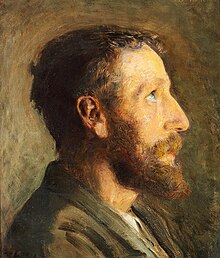L. A. Ring
| Laurits Andersen Ring | |
|---|---|

The Painter L. A. Ring, 1901 by
Knud Erik Larsen |
|
| Born |
Laurits Andersen 15 August 1854 Ring, Denmark |
| Died | 10 September 1933 (aged 79) Skt. Jørgensbjerg, Denmark |
| Nationality | Danish |
| Education | Royal Danish Academy of Fine Arts |
| Known for | Painting |
| Movement | Symbolism; Social realism |
Laurits Andersen Ring (Danish: [ˈlɑu̯ʁ̞its ˈɑnɐsn̩ ʁ̞æŋ]) (15 August 1854 – 10 September 1933) was one of the foremost Danish painters of the turn of the 20th century, who pioneered both symbolism and social realism in Denmark. Considered one of the masterpieces of Danish culture, his painting Summer Day by Roskilde Fjord was included in the 2006 Danish Culture Canon.
Born as Laurits Andersen in the village Ring in southern Zealand Ring's parents were wheelmaker and carpenter Anders Olsen (1816–83) and farmer's daughter Johanne Andersdatter (1814–95). In 1869, he became a painter's apprentice because his older brother was to take over the father's workshop. In 1873, while working in Copenhagen Laurits decided to take classes in painting, and after two years of private studies he was accepted at the Danish Academy of Arts in 1875 and studied briefly with painter P. S. Krøyer. He was never content with the academy and disliked the strict training in classical disciplines.
In 1881, he and his friend, the painter Hans Andersen from the village of Brændekilde, decided to change their last names, taking the names of their native villages, in order to avoid confusion at their joint exhibition. Laurits became L. A. Ring, and his friend Hans became H. A. Brendekilde. Ring's first exhibition took place in 1882, but he did not acquire recognition until 1884, the year in which he finished The Railroad Guard (Banevogteren, 1884). At this time, Denmark was in political turmoil, as the Council President Estrup had bypassed democratic rule and governed through decrees. Ring was politically active in the "Rifle movement", a revolutionary group of students taking up arms training in preparation for a rebellion. Ring became increasingly interested in the difficulties of the poor and social justice for the lower classes.
...
Wikipedia
